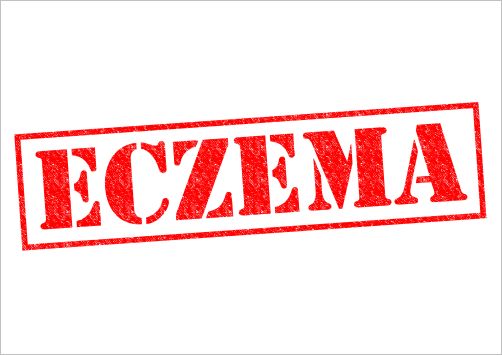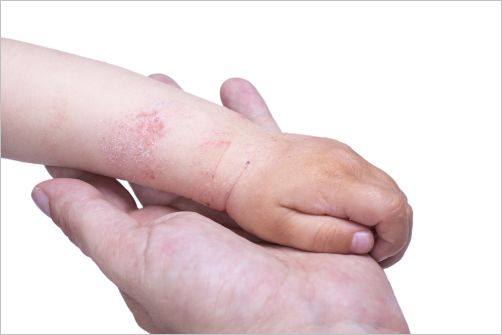Fed Up With Toddler Eczema?
I have never experienced toddler eczema with my son. We have been Blessed. However, I have known friends who had to deal with this skin problem. I feel that is important to address any skin issues with toddlers. We are going to start with some basic facts about eczema and how you can deal with some of the effects of this rash.
Toddler eczema is a skin rash that tends to appear in a child's first five years. At this age, eczema usually shows up on the forehead, cheeks, and scalp, but it can spread to the arms, legs, chest, or other parts of the body. Your toddler's rash might look like dry, thickened, scaly skin, or it might be made up of tiny red bumps that can blister, ooze, or become infected if scratched. Eczema isn't contagious, but because it is intensely itchy, scratching can be a problem.

There really is no main cause of eczema. The experts say that the tendency to have eczema is often inherited. So your child is more likely to have it if you or a close family member has had eczema, asthma, or allergies. Eczema is not an allergic reaction to a substance.
What are some Triggers of Toddler Eczema?
- Allergens in your toddler’s diet. Certain foods can trigger episodes if your toddler has been diagnosed with Eczema.
- The rash can be aggravated by heat. The sunshine or even just your toddler playing and their body temperature getting hot.
- Certain materials your child’s skin may come in contact with. Wool and polyester for example.
- Chemicals in soaps, lotions or detergents.
- Changes in temperature and dry skin
What can I do to treat Toddler Eczema?
- Use a mild soap and detergents that are "eczema friendly".
- Rapid changes in temperature can make toddler eczema worse, so try not to let your child get too hot.
- Allow your child's skin to breathe (and not become overheated) by dressing her in smooth natural fabrics, like cotton. Avoid wool and other scratchy materials, which can irritate her very sensitive skin.
- Pollen and allergies can also trigger or worsen eczema. You may want to consult an allergist, who can provide tips on how to deal with seasonal allergies. Also consult your pediatrician about their allergies as well.
- Certain allergenic foods can trigger eczema or make it worse.
Switch to mild, fragrance-free soaps and shampoos, or those made for sensitive skin. Use mild, fragrance-free detergent for washing your toddler's clothes and bedding. Avoid fabric softeners. Wash and shampoo your toddler at the end of her bath so she isn't sitting in soapy water. As soon as you get your toddler out of the tub, pat her skin dry (don't rub), then promptly apply a liberal amount of moisturizer, an ointment, cream, or lotion. Talk to your pediatrician about the best type of soaps and lotions for this.
Special Note: Try to keep your toddler's skin from becoming too dry. Talk to your pediatrician about how often to bathe your toddler. Many experts now believe that daily bathing can be helpful for children with eczema. Just don't make the water too hot, because very warm water dries out the skin faster.
If you or your doctor suspects that your toddler eczema is affected by certain foods, the mostly likely culprits are cow's milk and eggs, followed by soy, wheat, peanuts, and fish. You may want to try eliminating suspect foods from their diet one at a time. You may want to talk to your pediatrician about how to do this properly. It can take some foods weeks to completely get out of a child’s system.

Tips that may help when your toddler is having an Eczema flare-up:
- Help your toddler avoid scratching and itching.
- During a flare-up, you can try applying cool compresses to the affected area, followed by a moisturizer.
- Remember to always discuss eczema with your pediatrician.
- Depending on the severity of the rash, there may be other needed treatments for your child.
I know this may be difficult. They may try to get relief by scratching and itching, but scratching and rubbing can further irritate or inflame their skin and make matters much worse. Use the softest sheets possible on their bed, and keep your toddler’s nails cut short. You can try to put him to bed with cotton mittens or socks on their hands. That may be hard with a toddler but worth a try.
The good news about eczema is that your toddler may outgrow it. The condition usually becomes less severe with age. And there are ways to manage it. By following the tips mentioned above and treating any flare-ups immediately, you can help keep their eczema under control. That is good to know.
* I am not a Doctor or Licensed Professional in the field of toddler eczema. I am a stay at home Mom passing on tips, advice and information that are based on my opinions. Always remember to consult your pediatrician with serious questions concerning your child and their skin problems.*
New! Comments
Have your say about what you just read! Leave me a comment in the box below.